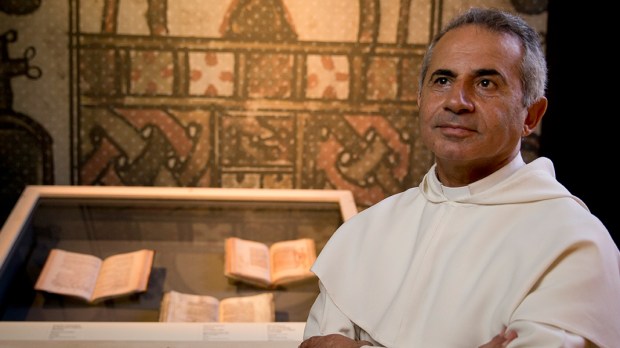Lenten Campaign 2025
This content is free of charge, as are all our articles.
Support us with a donation that is tax-deductible and enable us to continue to reach millions of readers.
A priest who guided Christians out of Mosul when the Islamic State group invaded, and saved more than 800 priceless manuscripts from the city has been nominated for the 2020 Sakharov Prize.
The Sakharov Prize for Freedom of Thought, named in honor of the Soviet physicist and political dissident Andrei Sakharov, is awarded each year by the European Parliament. It was established in 1988 to honor individuals and organizations defending human rights and fundamental freedoms.
When ISIS arrived in Mosul in the summer of 2014, Dominican Fr. Najeeb Michaeel (also known as Najib Mikhael Moussa) ensured the evacuation of Syriac and Chaldean Christians to Iraqi Kurdistan. In addition, he safeguarded more than 800 manuscripts dating from the 13th to the 19th century. These manuscripts were later digitized and exhibited in France and Italy. In December 2018, Fr. Michaeel, 65, was elected Chaldean Archbishop of Mosul.
According to the Vatican’s website when he was elected Archbishop Michaeel, was born in Mosul and studied to work in the oil industry. But he entered the Order of Preachers and went to France for his novitiate. He was ordained a priest on May 16, 1987, then returned to Mosul, where he eventually founded and directed the Digital Center for Oriental Manuscripts of Mosul (CNMO).
He was also a professor of pastoral theology and communication at the Babel College (Chaldean Seminary), first in Baghdad and then in Erbil. He spent several months in the United States to continue his formation, then returned to Ankawa, the Christian quarter of Erbil.
He speaks Arabic, Syriac, French and English.
When he was ordained a bishop two years ago, he told the French news agency AFP, “Our message to the whole world, and to Mosul’s people, is one of coexistence, love, and peace among all of Mosul’s different communities and the end of the ideology that Daesh (ISIS) brought here.”
The AFP report explained how he managed the preservation of nearly 850 ancient manuscripts in Aramaic, Arabic and other languages, as well as 300-year-old letters and some 50,000 books during the years he served at Al-Saa Church (Our Lady of the Hour) in Mosul:
In 2007, he transferred the archives to Qaraqosh, once Iraq’s largest Christian city, to protect them during an Islamist insurgency which saw thousands of Christians flee Mosul. And when IS — who was notorious for defacing churches and destroying any artefacts deemed contrary to its neoconservative interpretation of Islam — swept across Iraq in 2014, Michaeel again took action. As the jihadists charged towards Qaraqosh, the Dominican friar filled his car with rare manuscripts, 16th century books and irreplaceable records and fled east to the relative safety of Iraq’s autonomous Kurdish region. With two other friars from his Dominican order, Michaeel also moved the Oriental Manuscript Digitization Centre (OMDC), which scans damaged manuscripts recovered from churches and villages across northern Iraq. From the Kurdish capital Arbil, he and a team of Christian and Muslim experts digitally copied thousands of Chaldean, Syrian, Armenian and Nestorian manuscripts.
After Iraqi forces recaptured Mosul from ISIS in the summer of 2017, Michaeel returned to the city, finding his church in ruins, “with rooms transformed into workshops for bombs and explosive belts and gallows had replaced the church altar,” AFP noted.
On the eve of his ordination as a bishop, the Chaldean Patriarch, Cardinal Louis Raphael Sako, said that the new spiritual leader of Mosul’s Chaldean community would have to focus on reconciliation and trust among the people of the city, “lost due to the violence of ISIS and fundamentalist ideology.”
“The new bishop has the task of restarting the dialogue and of encouraging Muslims themselves towards reconciliation and reconstruction — reconciliation and trust — from a perspective of lasting peace,” the patriarch said, according to Asia News:
Finally, he will have to help Christians “reconnect the threads of history in Mosul, revive churches and places of worship, some of which are among the oldest and most important for the Chaldean Church. They are part of the life and history of the city.”
Also nominated for the Sakharov Prize are the democratic opposition in Belarus, which includes the main opposition candidate, Sviatlana Tsikhanouskaya, and the Guapinol environmental activists and Berta Cáceres from Honduras. Cáceres was assassinated in 2016.
The award is named after Russian physicist Andrei Dmitrievich Sakharov (1921-1989), who won the Nobel Peace Prize in 1975. He first came to prominence as the father of the Soviet hydrogen bomb. Concerned about the implications his work had for the future of mankind, he sought to raise awareness of the dangers of the nuclear arms race. In the USSR, Sakharov was seen as a subversive dissident. In 1970, he founded a committee to defend human rights and victims of political trials. He was exiled to Gorky by the Soviet authorities in order to limit his contacts with foreigners.
The Conference of Presidents, which consists of Parliament President David Sassoli and the political group leaders, will select the laureate on October 22. The prize will be awarded in a ceremony at the Parliament on December 16.

